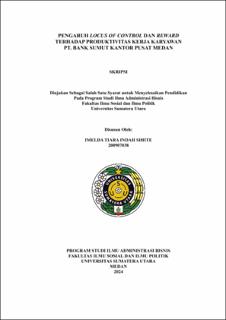Pengaruh Locus of Control dan Reward terhadap Produktivitas Kerja Karyawan PT. Bank Sumut Kantor Pusat Medan
The Influence of Locus of Control and Rewards on Employee Productivity at PT. Bank Sumut Head Office in Medan

Date
2024Author
Sihite, Imelda Tiara Indah
Advisor(s)
Safrin, Feby Aulia
Metadata
Show full item recordAbstract
PT. Bank Sumut Head Office Medan needs a better assessment of employee productivity to improve the company's performance. Employee productivity assessment can be conducted by analyzing factors influencing employee productivity such as locus of control and rewards. This analysis helps identify which factor has a greater impact on enhancing employee productivity at PT. Bank Sumut Head Office. This study aims to analyze the effect of locus of control and rewards on employee productivity at PT. Bank Sumut Head Office Medan Human Resources Division both partially and simultaneously.
This research employs a quantitative method. The population in this study includes employees of PT. Bank Sumut Head Office Medan Human Resources Division, with a sample size of 31 respondents. The sampling was conducted using a non-probability sampling method with a saturated sampling approach. Data collection was carried out using a questionnaire measured with a Likert scale. The analysis methods used in this study include instrument tests, classical assumption tests, multiple linear regression analysis, and hypothesis testing. The testing was conducted using Ms. Excel and SPSS version 25.
The results of this study indicate that the locus of control variable has a negative and significant effect on employee productivity, while rewards do not affect employee productivity. Additionally, locus of control and rewards simultaneously influence employee productivity. Based on the Adjusted R Square value, it is known that the locus of control and rewards variables contribute 55.9% to the employee productivity variable, while the remaining 44.1% is influenced by factors outside of this study.
Collections
- Undergraduate Theses [1456]
